
Go Inside Trea Turner
By Jordan Burchette
Make no mistake: Trea Turner is a complex guy. It’s the double plays that are easy.
The Philly shortstop and LADDER athlete kindly sat down with us once again for a wide-ranging interview, the interrogative equivalent of a late-season tilt for first place in which we launched hardballs, softballs, and oddballs intended to keep baseball’s fastest man off balance.
But Trea fielded them all cleanly, never letting a question get out of the infield. Subjects included stand-up comedy, Legos, “the Green Day” (see below), and how the competitiveness to complete a household project can rival the drive to win a pennant.
Take your training to the next level with LADDER's high-quality performance supplements.
.
LADDER: You're among an elite group of five-tool baseball players. What’s your sixth tool?
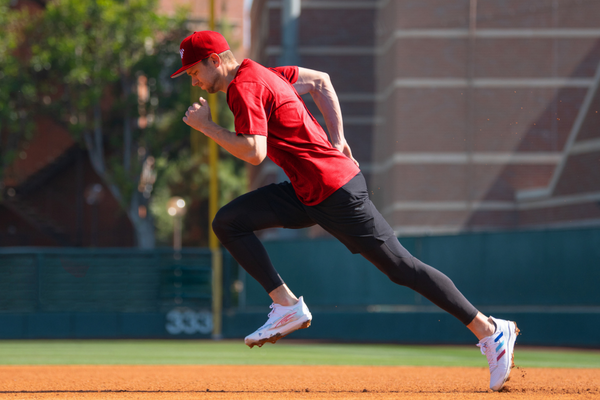
TREA: Sixth tool... hmm… understanding the game. When I was a kid, I was smaller than everybody. To compete with kids that were bigger and stronger than me I had to really learn the game — how to bunt, play defense, do the little things.
That helps me each and every day now. And I learned it at a young age, maybe in high school. I had some good coaches, and I still use a lot of the things they taught me — and that are still taught by my coaches [in the pros]. So, I'm thankful for that.
.
What's funny to you that never seems funny to others?
I love stand-up comedy — I watch it a lot. I don't know if there's one specific thing, but I enjoy poking fun at friends and receiving it. That's where you build special bonds with people. When you can joke with somebody and they can joke with you and you can both laugh it off and come together — that's what a clubhouse is.
.
Got any favorite stand-ups?
My wife's probably sick of him, but I follow Tom Segura on social media and would probably go with him as my favorite.
But I try to watch a little bit of everything, and I even got my wife on [stand-up]. At first, she was like, "What is this?" and now she's enjoying it with me.
.
So stand-up was alien to her before you came along?
Yeah, I mean it was kind of alien to me, to be honest. I never really thought I'd be a stand-up guy, but I started putting it on when I'm going to bed and it became a habit.
.
So who joins Segura on your comedy Rushmore?
I'd definitely go with Dave Chappelle, Bill Burr, and I'm probably leaving a lot of people out, but Bert Kreischer. I get a good laugh out of him too.
.
You’ve got to be good at reading pitchers to hit well — are you good at reading people generally?
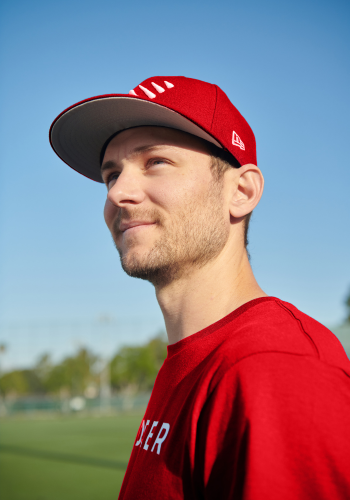
Yeah, I think I’ve got a good read on people. I try to always take in information: Why would somebody do that? Does it benefit them? Does it not benefit them?
You can watch people's body language and things they do and tell you; what's important to them. So, yeah, I think I’ve got a good read, and I think it's helped me in my baseball career, for sure.
.
What do you think the worst sound on Earth is?
Man, anything that sounds broken. You get in a car or on a plane and you hear something that's not right or doesn't sound familiar. That's a bad sound to me. And 99.9% of the time, it means nothing, but when something sounds broken, I don't like it.
.
Are you generally the type to try to fix it?
Yeah, definitely. I went to school for engineering, and I guess that's what engineering is — just solving problems.
So yeah, I'm a tinkerer. I get satisfaction out of being able to do something I didn't know I could do, so I'll watch a video and learn how to do something and try to implement it myself.
.
What’s something mundane that readers might be surprised to learn you have to deal with?
I think there is a misconception — and a lot of times it’s true — that people with money and fame don't do [common household tasks], but I think I do it plenty, my teammates do it plenty. Whether it's fixing furniture or mowing the lawn or, during COVID, I did a lot of things around the house because we were stuck there.
.
Did you pick up any pandemic hobbies? Bake sourdough bread? Knit bat warmers?
You know what I got back into, actually? Legos. I used to love Legos as a kid. I hadn't seen them in 15 or 20 years, and then I went over to my buddy's house, and he started doing them. Now that I’ve got a 2-year-old, he's liking Legos too. So it's been kind of a cool bonding between me and him.
.
And Legos help cultivate that engineer instinct in the kid, right?
Yeah, definitely. Solving problems, figuring out how things go together. When I was a kid, it was just a block on a block, but now they’ve got engines and all sorts of mechanical functions. So, it's been cool rediscovering it.
.
Competition comes up a lot in interviews with you — including ours last year — as a driving force. Besides baseball, what are you most competitive about?
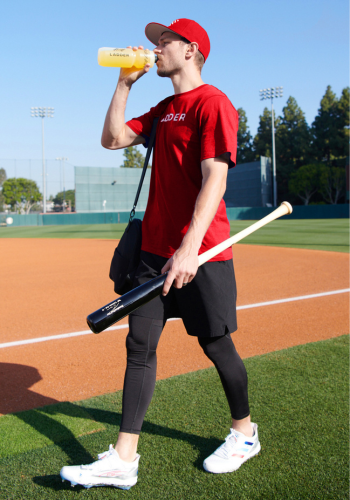
Anything, really. Take what we just were talking about: the competitiveness is like, “this is broken, I can fix it.” And you don't want to admit that you can't, that you need somebody else to do it for you.
Sometimes the challenges are too big, whether it's plumbing or electrical — you can't do everything. But that competition is just trying to be a better person, trying to learn something, trying to grow. And it applies to a lot of different areas.
.
Is there a house project that you're proudest to have completed?
It's funny, during COVID I wanted to put lights in my yard. So I bought some stuff from Home Depot, dug the trenches, laid the wires, put the lights in and lit up some trees and stuff. I was super pumped about it.
But a few months go by and they stop working, and I'm sure I did it wrong, so I ended up having to hire somebody to redo it. So, I was pretty proud of that… at first. But it ended up not working in the end.
.
If you formed a rock band, who would your musical influences be?
I used to listen to Blink 182 and Sum 41 a lot when I was in middle school, so somewhere around that era.
We also sang Green Day. Whatever band that was. That song was called “The Green Day,” maybe? I don't know.
.
You mean the band Green Day?
See, that was so long ago I don't remember. But yeah, a combination of those groups.
.
You revealed in an in-game interview last season that you’d been using your glove longer than you probably should have. How often do you replace your equipment?
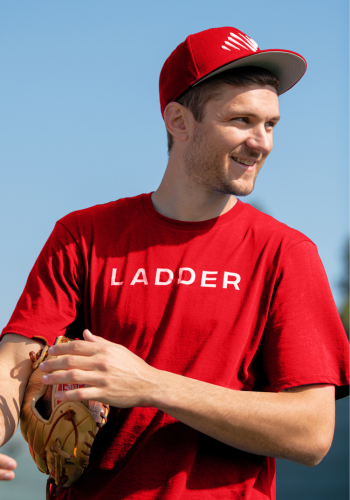
It depends. I break a bat every few days or so, maybe every week. If you don't get a hit, you blame the bat and replace it. Batting gloves — same deal. If they rip or you're not feeling it, then you replace those.
But when you find a good fielding glove, it's hard to replace. I'm trying to find a new glove right now because the ones I have are getting old. The two I've used a lot this year and last year are four or five years old, maybe more.
.
Wow, the glove from that interview is still in the rotation?
Yes, definitely. There's like three gloves I use that are probably five or six years old. When you use a new glove and make a mistake, you just think it's not ready, it was the glove's fault, whereas I have confidence in those three. And then in batting practice or early work I'll try other ones out.
.
Who knew broken bats happened that frequently?
It depends. Some guys break one every few days and some guys go two months without breaking a bat, which is pretty impressive. I don't know how to do that.
.
What about cleats? How often do you go through those?
Cleats are interesting because your body wasn't really meant to stand on metal spikes for hours a day. And obviously [manufacturers] do as good a job as they can to make that comfortable, but I like to keep switching them out. I'm not the type of guy that is scared of a brand new pair, so I'll [replace them] every two weeks or every month.
.
What about caps?
I actually just got a new one the other day for the first time all year because I left mine back in Philly. But [usually], I'll do like one a year. Some of these guys have all sorts of stuff on [their caps], whether it's pine tar or sweat or whatever, and I never really had any of that, so I just kind of stick with one all year.
.
Let’s break down the anatomy of an at-bat. Where are you looking before the pitcher releases the ball?
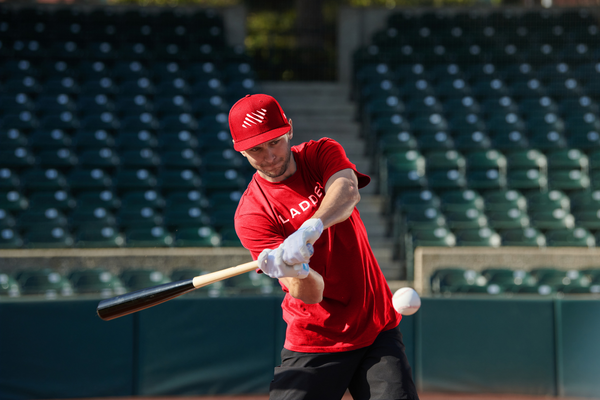
That's a good question. I think a lot of times I find myself looking at their eyes or their face in general, and then your timing is based on their body actions. So, you slowly move to the body and then to a release point.
But, the last few years, a lot of guys have been throwing real funky. So, sometimes I'll stare at the ground or I'll stare off — it looks like I'm not even looking at [the pitcher] because I’m trying to pick up where they're releasing the ball a little bit faster.
With everybody it’s a little bit different: Some guys you see better and some guys you don't, and it's about finding that release point as fast as you can. But I find myself just staring at their body slightly before they release the ball.
.
Are there little things you do to get an edge with a pitcher, whether it's body language or eye contact?
Some guys do that. They feel like they're getting in [the pitcher’s] head, but I never really did that — I don't know if it necessarily works.
I'm worried about hitting, not necessarily how I get into [the pitcher’s] head. I'm there trying to hit a target. For me, it's hard to do both those things at the same time.
.
When you swing, is that intentional or instinctual?
Both. Sometimes you feel like, “How did I even do that?” and your body just takes over. And then sometimes you're looking for a certain pitch, and trying to hit in a certain spot.
I always want to be, I think “aggressive” is a good word for me. Whatever I'm trying to do, I want to do it with intent, and be aggressive with it and not second-guess it.
.
Are there times when you recognize that instinct is saying, “No, I got this?”
Yeah, for sure. We have all these stats and charts that say [the pitcher’s] going to do this or that — and a lot of times they're right. But sometimes they're wrong.
So, you’ve got to watch the game, you’ve got to know what he's done before. Does he like this pitch today or that pitch? It's always changing. That's where you say, “Forget all those numbers, I'm just gonna go up there and see the ball and react.”
Probably the most important thing is having that baseball instinct. That “It” factor is being able to react and have confidence and not necessarily rely on all the numbers.
.
And that instinct is the residue of all the training and practice and drills.
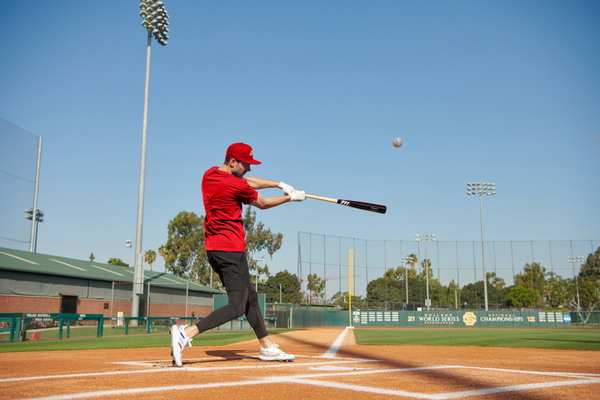
Yeah, just playing hundreds and thousands of games over your life. A lot of us who are playing in the big leagues have played since we were little kids. So, it's ingrained in you and you don't even really think about it. It's just part of you.
.
What on-field feat gives you the biggest surge?
The homer’s always a fun one — doesn't get much better than that. But winning the World Series as a team is obviously never going to be topped. And those stretches in the playoffs when you're winning and moving on. That's what everyone says, but it’s the truth.
.
Who's your best friend in baseball that isn't on your team?
Oof.
.
If this is gonna get you in trouble with people, you don't have to answer.
No, no. A lot of the Nats guys from that 2019 team I'm still good buddies with. Juan Soto, Max Scherzer, Patrick Corbin — those are guys that I talk to quite often. And then Anthony Rendon, as well.
If you win, you have those bonds. Those guys that I played with those few years in Washington are probably my closest friends that aren't on my team.
.
What would you say motivates you above all else?
Competitiveness obviously comes to mind first, but I just like doing my job. My job is to play shortstop and hit. I want to do whatever is asked of me well, and I get satisfaction out of that.
.
Does that come from a sense of duty?
Yeah, a little bit. I never liked getting in trouble when I was a kid. My mom would yell at me and I would hate it. Or she would yell at my sister, and I’d go, “I’m not doing that,” because she just got yelled at.
I hated getting yelled at as a kid, and I think that doing your job is kind of like that. I don’t want to get yelled at by the boss. I just want to do my job and I don’t care if somebody recognizes me for it, I’m just happy with myself.



